|
Review Unit: e-mova – Core Ukrainian 10
Congratulations! You have covered many of the basic structures and patterns which will allow you to speak, read and write Ukrainian at an introductory level. Now, your main task will be to expand your vocabulary and knowledge of grammatical structures in e-mova: Ukrainian 20 and 30 so that you can continue to read, write and participate in conversations with greater ease.
It is recommended that you add to your personal language learning by browsing through Ukrainian websites, newspapers, journals and books. Don't be afraid to extend your language learning beyond what you have studied in the classroom or in an online course. Even if you are a language ‘beginner', there is much to be gained by searching Ukrainian websites and print materials for familiar words and phrases. You are encouraged to use a Ukrainian-English dictionary as often as necessary when you run into difficulty.
It's a good idea to get into the habit of reading about global news or weather in Ukrainian. It will be easy for you to ‘guess' the meanings of many words, as you will be familiar with their context from English media sources. You may access good source of information on the homepage of this course under the News, Weather, Calendar icon.
Putting the pieces together...
A review of all material covered in e-mova – Core Ukrainian 10 is provided below. To view the Powerpoint presentation associated with each unit, please click on the Dialogue title which is highlighted in blue. |
|
Please select from the following units of study:
Unit I: Meeting and Greeting Friends
Unit II: Conversing With A Friend
Unit III: Tickets to the Game
Unit IV: Attending An Event
Unit V: Greeting Adults and Peers
Unit VI: Keeping In Touch By Letter and E-mail
Unit VII: Telephone Conversations
Unit VIII: We Like To Talk Frequently
Unit IX: Friends and Families
Unit X: Plans for the Day

Unit I: Meeting and Greeting Friends
 |
|
Розмова 1 – Добридень
Роман Білан питає пана Козака, чи Тарас* тепер удома. Пан Козак відповідає, що Тарас удома і просить** Романа ввійти до хати.
*Роман Білан і Тарас Козак – друзі
** просить – invites
|
Nouns in the Nominative Case – are words which refer to a person, place,
thing or quality and are used:
a. when a noun is the subject of the sentence
b. when a noun follows the word є (usually omitted in Ukrainian)
Masculine: дім, пан, хлопець, чоловік (end in a consonant or ь)
Feminine: дівчина, жінка, пані, панна (end in а or я, exception - i)
Nouns in the Vocative Сase - used to address someone or to call out to them.
Masculine: ending in a consonant - add е (Тарасе, Романе, пане)
Feminine: ending in an a - change to o (Оленко, панно, Анно)
ending in a я - change to ю (Соню, Лесю)
After the Vocative form ‘пане’, a male surname does not change to the Vocative form. The word пані and the corresponding female surname do not change to the Vocative form.
Personal Pronouns - used to replace nouns.
Singular: я, ти, він, вона, воно
Plural: ми, ви, вони
Interrogative Pronouns – used to ask questions.
де, хто, чи, що
Demonstrative Pronouns – used to point to people or things.
це
Adverbs – used to express place, location or time of action.
де, ні, так, там, тут, удома (вдома)
Conjunctions – used to connect parts of sentences.
і / й
Note that vowel endings will determine the use of each form in a particular sentence.
Particles – used to create a question.
чи
Expressions which were covered in this unit:
Добридень! – Good day! (Hello)
До побачення! – Good bye!
Прошу! – Please!
Дякую! – Thank you!
Прошу ввійти! – Please enter/please come in!
|
Return to the
Units of Study
Main Menu |

Unit II: Conversing With A Friend
 |
|
Розмова 2 – Що робиш?
Тарас і Роман розмовляють. Тарас питає, що Роман робить. Роман відповідає, що він тепер читає журнал про спорт.
|
Nouns in the Accusative Case – these nouns are used:
a. when a noun is the object of the sentence (referring back to the action of the
verb)
b. when a noun follows the preposition про
Masculine (inanimate) nouns do not change: баскетбол, бейсбол, бовлінґ, волейбол, гокей, ґольф, журнал, зошит, керлінґ, лист, підручник, словник, спорт, тато, текст, теніс, футбол
Feminine nouns change as follows:
ending in a change to у (маму, панну, Анну)
ending in я change to ю (Галю, Надю, Марію)
Plural noun forms do not change (карти, шахи, шашки). Verb Infinitive – this is the basic form of a verb before it is conjugated. The infinitive is created by adding the ending ти to the stem of a verb, i.e. читати, слухати, питати.
Verbs - Present Tense, Group 1 Conjugation.
Verb endings are governed by the nouns or pronouns which are used with them. They can be in the past, present or future tense. This course introduces only the present tense. Verbs are conjugated according to certain group ‘patterns’. In this Unit, you were introduced to the Group 1 Conjugation pattern, also know as the є-ють group.
singular |
|
plural |
|
| я читаю |
|
(я і Тарас) |
ми читаємо |
| ти читаєш |
|
(Павло і ти) |
ви читаєте |
(дід) він читає
(мама) вона читає
|
|
(Ліана, тато, мама) |
вони читають |
Interrogative Pronoun – the word що is used to create a question, i.e. Що ти робиш? Про що ти читаєш?
Adverbs of time – коли and тепер are introduced. The adverb коли is often used to create a question, i.e. Коли ти читаєш?
Conjunction – the conjunction а is placed in a question for emphasis (somewhat like ‘and’ in English), i.e. А що ти читаєш?

Unit III : Tickets to the Game
 |
|
Розмова 3 – Квитки
Роман питає Тараса, чи він хоче йти на футбол. Роман уже має квитки. Тарас хоче йти на футбол, бо Вінніпеґ і Саскатун грають.
|
Proper Nouns – names of Canadian cities, provinces and territories.
Провінція (Province) |
Місто (City) |
|
|
| Британська Колюмбія |
Вікторія*, Ванкувер |
| Альберта |
Едмонтон*, Калґарі |
| Саскачеван |
Ріджайна*, Саскатун, |
| Манітоба |
Вінніпеґ* |
| Онтаріо |
Торонто*, Оттава |
| Квебек |
Квебек Сіті*, Монреаль |
| Нью Бранзвік |
Фредеріктон* |
| Нова Шотляндія |
Галіфакс* |
| Острів Принца Едварда |
Шарлоттавн* |
Ньюфаундленд
|
Сейнт Джонз* |
|
|
Територія (Territory) |
Місто (City) |
|
|
| Юкон |
Вайтгорс* |
| Північно-Західні Території |
Єллоунайф* |
| Нунавут |
Іквалуіт* |
|
*столиця (capital city) |
Verbs – грати, мати
These verbs follow the Group 1 Conjugation pattern.
Interrogative Pronoun – the pronoun хто requires a response in the third person singular:
Хто грає у футбол? – Саскатун і Вінніпеґ грають. (Вони грають.)
Хто має квитки на волейбол? – Тереса має квитки. (Вона має)
Personal pronoun - ви. It can be used as the 3rd person plural (they) or as a sign of respect for strangers, the elderly or authority figures.
Prepositions – use of на and у/в in the Accusative Case were introduced.
The preposition на may be used after a verb to indicate attendance at an event, i.e. Ходімо на футбол!
The preposition у/в indicates participation in a sport, i.e. Ми граємо в теніс.
Note that vowel endings will influence the choice of either у or в in a sentence.

Unit IV : Attending An Event
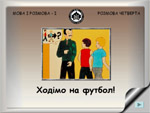 |
|
Розмова 4 – Ходімо на футбол!
Пан Козак питає, чи Тарас і Роман мають гроші на футбол. Хлопці відповідають, що вони мають гроші. Тепер хлопці можуть іти на футбол.
|
Nouns - singular and plural forms.
Most nouns in Ukrainian have both a singular and plural form, i.e. хлопець - хлопці, квиток – квитки, дівчина – дівчата, долар – долари, студент - студенти.
Exceptions: the word гроші is one of several Ukrainian nouns that appears only in the plural form.
Numerals: agreement with masculine nouns.
The masculine form of nouns changes with certain number patterns. A sample is given below.
| 1 долар |
|
21 долар |
| 2, 3, 4 долари |
|
22, 23, 24 долари |
| 5-20 доларів |
|
25-30 доларів |
Verbs: variation of the є-ють Group 1 Conjugation
An alternate е – уть pattern is introduced for the verb іти. The stem changes to ід when it is conjugated.
singular |
|
plural |
|
| я йду |
|
(Я і Тарас) |
ми йдемо |
| ти йдеш |
|
(Павло і ти) |
ви йдете |
(дід) він іде
(мама) вона йде
|
|
(Анна, татo, мама) |
вони йдуть |
Adverbs: - куди, де
The adverb куди is used to create a question when there is motion in a particular direction (where to?), while де is used to ask about the location of stationary people, places or things, i.e. Куди Лариса йде? Де Лариса тепер? 
Unit V: Greeting Adults and Peers
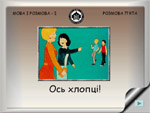 |
|
Розмова 5 – Ось хлопці!
Олена й пані Козак розмовляють з Тарасом і Романом. Вони питають, куди хлопці йдуть. Тарас і Роман відповідають, що вони йдуть на футбол. Олена не хоче йти на футбол. Вона йде на волейбол, а мама йде додому.
|
Nouns - Nominative and Accusative cases.
Note that in both the singular and plural forms, the endings of the hard masculine nouns (hard nouns end in consonants with the exception of й and ь) in the Nominative and Accusative case do not change.
Vocative case – all names, including those with soft endings, have been given.
Masculine: ending in a consonant - add е (Тарасе, Романе, пане)
ending in й - change to ю (Андрію)
ending in ь - change to ю (Василю)
Feminine: ending in a - change to o (Оленко, панно, Анно)
ending in ія - change to іє (Маріє, Надіє, Юліє)
ending in я - change to ю (Дарусю, Надю)
Nouns - дід, дідо, баба were added in this unit.
Verbs – review of Group 1 Conjugation є - ють verbs читати, мати, грати, питати, слухати and Group 1 Conjugation е - уть verb іти.
Imperative Verbs – review of the imperative form as a command or directive, i.e. ходімо, ідіть.
Conjunction – creative use of the conjunction а to begin a question, i.e. А що ти робиш? Common use of the conjunction a to highlight a contrast between two simple sentences, i.e. Мама йде додому, а я йду на волейбол.
Particle - ось (here’s…) was introduced in this unit.
Adverbs - note the adverbs derived from the noun дім (home)
1. додому (in the direction of home)
2. удома/вдома (at home)
Note that vowel endings influence the use of either удома or вдома in a sentence.

Unit VI: Keeping In Touch By Letter and E-mail
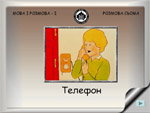 |
|
Розмова 6 – Оленка пише
Петрик – брат Оленки. Він питає, що Оленка тепер робить. Оленка пише листа до товаришки, Лариси. Лариса живе в Едмонтоні й Оленка часто пише листи до неї. Пертик думає, що тільки дівчата так часто пишуть листи!
|
Nouns in the Genitive Case are used after the preposition до
Feminine: ending in a - change to и (Оленки, панни, Анни)
ending in ія - change to ії (Марії, Надії, Юлії)
ending in я - change to і (Дарусі, Наді)
Masculine: ending in a consonant - add а (Тараса, Романа, пана)
ending in й - change to я (Андрія)
ending in ь - change to я (Василя)
ending in о - change to а (тата)
Nouns in the Accusative Case - used after the preposition у/в and the days of the week:
Masculine: endings do not change.
Feminine: days ending in a change to у,
days ending in я change to ю.
| неділя – Sunday |
|
у неділю – on Sunday |
| понеділок – Monday |
|
у понеділок – on Monday |
| вівторок – Tuesday |
|
у вівторок – on Tuesday |
| середа – Wednesday |
|
у середу – on Wednesday |
| четвер – Thursday |
|
у четвер – on Thursday |
| п’ятниця – Friday |
|
у п’ятницю – on Friday |
| субота – Saturday |
|
у суботу – on Saturday |
Nouns in the Locative case - indicate the stationary location of someone or something. They are always preceded by the prepositions у/в or на.
Masculine: ending in a consonant - add і (Едмонтоні, Саскачевані),
ending in г - change to зі (Вінніпезі)
Feminine: ending in a - change to і (Оттаві, Канаді),
ending in я - change to ї (Британській Колюмбії)
Neuter: ending in o - change to і (Торонті) (Note: Торонто is also correct.)
Nouns related to computer technology are introduced in this unit, i.e. комп’ютер, інтернет, е-лист, е-адреса, е-пошта, е-мейл, лінк, файл, веб-сайт. Other nouns added to this unit are календар, країна
Verbs - alternate е – уть Group 1 Conjugation endings are introduced in this unit. The verbs are жити and писати. Note that the stems of each verb change when they are conjugated:
singular |
|
plural |
|
| я живу |
|
(Я і Тарас) |
ми живемо |
| ти живеш |
|
(Павло і ти) |
ви живете |
(дід) він живе
(мама) вона живе
|
|
(Ліана, тато, мама) |
вони живуть |
singular |
|
plural |
|
| я пишу |
|
(Я і Тарас) |
ми пишемо |
| ти пишеш |
|
(Павло і ти) |
ви пишете |
(дід) він пише
(мама) вона пише
|
|
(Ліана, тато, мама) |
вони пишуть |
Pronouns in the Genitive Case - change their form after the preposition до.
хто becomes до кого
я becomes до мене
ти becomes до тебе
він becomes до нього
вона becomes до неї
Conjunctions - used to create a comparison between two contrasting ideas. Note the use of the conjunction але.
Я пишу до Тараса, але він не пише до мене.
Prepositions – are governed by certain cases. Note the summary given.
до - always followed by the Genitive case:
Він пише листа до Марії.
у/в - followed by the Accusative Case when there is motion implied, i.e. playing sports/games. It is also used with days of the week.
Вони грають у карти в неділю.
у/в - followed by the Locative Case when describing a stationary location (no motion).
Панна Жук живе в Оттаві.
Adverbs of time – are introduced to indicate how frequently an action is taking place. The compound words щодня (everyday) and щотижня (every week) are formed by combining the prefix що to the word день (day) and тиждень (week). Other adverbs: лишe, так часто, справді, певно.
|
Return to the
Units of Study
Main Menu |

Unit VII: Telephone Conversations
 |
|
Розмова 7 – Телефон
Роман Білан хоче говорити з Оленкою Козак. Він телефонує до Оленки, але пані Козак, а не Оленка, відповідає. Роман питає, чи можна говорити з Оленкою.
|
Nouns in the Instrumental Case – used after the preposition з (with). The questioning phrase З ким? (With whom?) requires an answer in the Instrumental case.
Masculine: ending in a consonant - add ом (Романом, Іваном)
ending in о - change to ом (Марком, татом)
ending in й - change to єм (Андрієм)
ending in ь - change to ем (Василем, вчителем)
Feminine: ending in a - change to ою (Оксаною, панною)
ending in я - change to ею (Сонею, Дарусею)
ending in ія - change to єю (Юлією, Надією)
Nouns in the Dative Case – have been introduced, but not emphasized in the course material. The case is used to indicate an indirect object of a verb. The questioning word Кому? (To whom/For whom?) requires an answer in the Dative Case.
Tато читає журнал Миронові.
(indirect object Мирон, follows direct object журнал)
Masculine: ending in a consonant - add ові (Романові, Іванові)
ending in о - change to ові (Маркові, татові)
ending in й - change to єві (Андрієві)
ending in ь - change to еві (Василеві, вчителеві)
Feminine: ending in a - change to і (Оксані, панні)
ending in я - change to і (Соні, Марусі)
ending in ія - change to ії (Юлії, Надії)
Verbs - new Group 1 Conjugation є – ють verbs: телефонувати, відповідати. Note that the stem of телефонувати is formed by dropping вати.
singular |
|
plural |
|
| я телефоную |
|
(Я і Тарас) |
ми телефонуємо |
| ти телефонуєш |
|
(Павло і ти) |
ви телефонуєте |
(дід) він телефонує
(мама)вона телефонує
|
|
(Ліана, тато, мама) |
вони телефонують |
Відповідати is a regular Group 1 Conjugation verb. Verbs - Group 2 Conjugation – the verb говорити (to talk) is introduced. This group is also called the ить-ать group, which illustrates its conjugation pattern. The ending ити is dropped and appropriate endings are added to the stem говор:
singular |
|
plural |
|
| я говорю |
|
(Я і Тарас) |
ми говоримо |
| ти говориш |
|
(Павло і ти) |
ви говорите |
(дід) він говорить
(мама)вона говорить
|
|
(Ліана, тато, мама) вони говорять |
|
Note: the word можна (May I?/ I can…) is always followed by a verb infinitive, i.e. Чи можна говорити з Оленкою? Тепер можна грати у футбол.
Demonstrative pronouns - це (this) is used to refer to a particular person or object, i.e. Чи це Павло? Це баскетбол, а не волейбол.
Adverbs – the words так and ні are always separated from the rest of a sentence by a comma, i.e. Так, він удома.
Prepositions - з is always used with the Instrumental case, i.e. Я йду на концерт з Марком.
Telephone numbers were introduced in this unit. In North America, a telephone number is given in single digits. In Ukraine, numbers are grouped together in double and triple digits. This is why the unit introduces the Ukrainian terms for ‘hundreds’: сто (100), двісті (200), триста (300), чотириста (400), п’ятсот (500),
шістсот (600), сімсот (700), вісімсот (800), дев’ятсот (900), тисяча (1000).
Expressions given in this Unit:
Галло! – Hello! (phone greeting only)
Можна... – Is it possible…? It is possible…
Будь ласка – If you would be so kind…
Вибач – Pardon me. Excuse me.
|
Return to the
Units of Study
Main Menu |

Unit VIII: We Like To Talk Frequently
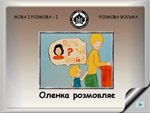 |
|
Розмова 8 – Оленка розмовляє
Петрик хоче говорити зі сестрою, Оленкою, але Оленка не хоче тепер говорити з Петриком! Вона розмовляє при телефоні з Романом.
|
Study the chart of Noun Declensions from the Unit.
CASE |
DESCRIPTION |
USE
|
Nominative
Називний |
Basic form of any noun; it tells you who or what the sentence is really about. Helpful questions: Who? What? |
Subject of the sentence
Хто? Що? |
Vocative
Кличний |
This case always refers to a person's name, their status/title, or a collective group. |
Form of address when speaking directly to an individual or a group.
|
Accusative
Знахідний |
This noun receives the action of certain verbs. The case shows movement or activity. Helpful questions: When? About whom ? About what? |
- Direct object of verbs such as писати, читати, мати, іти.
- after the preposition у/в, на and verbs which conveys action, such as грати, or motion, such as іти.
- after the preposition у/в and the days of the week or the months of the year.
- after the preposition про
Що? Коли? У що? Про що? Про кого?
|
Locative
Місцевий |
This case shows the stationary location of someone or something. Helpful question: Where? |
- after the prepositions у/в, на, при when no motion is involved.
Де?
|
Genitive
Родовий |
This case is best know for showing possession (Note: there is no 's or s' in Ukrainian) and for its use in negative sentences. It is used after several prepositions and when speaking about partial quantities. Helpful question: To whom?
|
- after the preposition до
До кого? |
Instrumental
Орудний |
Nouns in this case indicate the important (instrumental) role something or someone plays in order for something to take place. Helpful questions: With whom? With what? How?
|
- after the preposition з
З ким? |
Dative
Давальний |
The case is used to show how someone or something is indirectly connected to the action conveyed by the verb. Helpful questions: To/For whom? |
- indirect object of verbs such as телефонувати.
Кому? |
Nouns – names of the months (місяці) of the year were given.
| січень - January |
липень - July |
| лютий - February |
серпень - August |
| березень - March |
вересень - September |
| квітень - April |
жовтень - October |
| травень - May |
листопад - November |
| червень - June |
грудень - December |
Verbs: the Group 1 є – ють regular verb розмовляти (to converse, to have a dialogue with) was introduced:
singular |
|
plural |
|
| я розмовляю |
|
(я й Тарас) |
ми розмовляємо |
| ти розмовляєш |
|
(Павло й ти) |
ви розмовляєте |
(дід) він розмовляє
(мама) вона розмовляє
|
|
(тато, мама, Леся) |
вони розмовляють |
Auxiliary Verbs assist other verbs in forming the tense, mood or voice of the sentence. These verbs follow the same rule of thumb in both Ukrainian and English: the auxiliary verb is conjugated, the second verb appears in the infinitive form. Note the use of the auxiliary verb хотіти (to want) in the sentence below.
Дівчата хочуть іти на концерт у неділю.
Хотіти is a Group 1 е – уть verb. It is conjugated by dropping the ending тіти and adding the consonant ч: хоч
singular |
|
plural |
|
| я хочу |
|
(я і Тарас) |
ми хочемо |
| ти хочеш |
|
(Павло і ти) |
ви хочете |
(дід) він хоче
(мама) вона хоче
|
|
(Ліана, тато, мама) |
вони хочуть |
Cultural Note: Conversations between family and friends are usually informal (Привіт! Як ти? Як ся маєш?), while conversations between acquaintances, strangers or older people are more formal (Добрий день! Як ся маєте?).
Pronouns – use of singular pronouns with certain prepositions was explained.
Nominative: Хто? я --- ти --- він --- вона
Genitive: (до) До кого? мене --- тебе --- нього --- неї
Accusative: (про) Про кого? мене --- тебе --- нього --- неї
Instrumental: (з) З ким? мною --- тобою --- ним --- нею
Prepositions: use of prepositions при, на (on, by at, near) with the Locative case, i.e. Оленка при телефоні. Оленка на телефоні. Adverbs of time: вчора (yesterday), сьогодні (today), завтра (tomorrow) were introduced.

Unit IX: Friends and Families
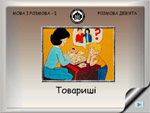 |
|
Розмова 9 – Товариші
Петрик питає, чому Оленка так часто говорить з Романом. Оленка відповідає, що Роман її товариш, а Лариса її товаришка. Петрик питає, про що вони розмовляють. Оленка відповідає, що з Романом вона говорить про спорт, а з Ларисою вона говорить про Романа!
|
Nouns - several words which mean ‘friend’ were introduced, such as друг/подруга, приятель/приятелька. The words товариш and товаришка are used most frequently in the course material. Some common Ukrainian sentence patterns were given:
subject – verb - complement: Андрій (є) мій товариш.
subject – verb –prepositional phrase: Ми розмовляємо про спорт.
Family tree – terms for family relationships were explained.
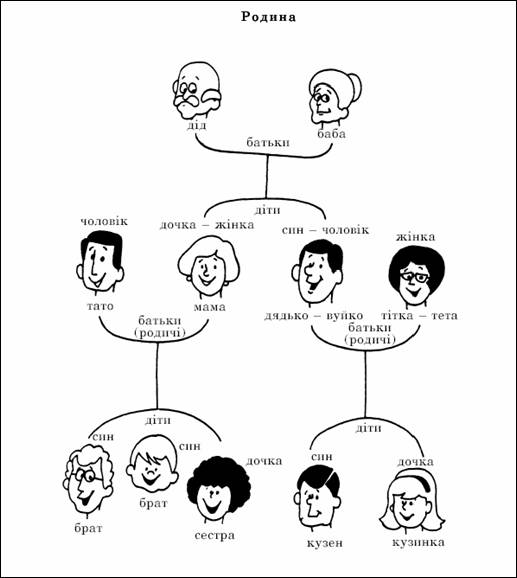
Verbs - the new verb думати (to think) from the Group 1 є – ють Conjugation was introduced:
singular |
|
plural |
|
| я думаю |
|
(я і Тарас) |
ми думаємо |
| ти думаєш |
|
(Павло і ти) |
ви думаєте |
(дід) він думає
(мама) вона думає
|
|
(тато, мама, Іван) |
вони думають |
Possessive Pronouns - мій, моя (mine) and твій, твоя (yours) were introduced. The forms мій and твій are used with masculine nouns, while the forms моя and твоя are used with feminine nouns.
мій брат; мій тато; твій підручник; твій товариш
моя кузинка; моя учителька; твоя баба; твоя мама
Prepositions: the altered form of з “ із ” is sometimes used to ease the flow of pronunciation in some sentences:
Про що ти розмовляєш із Романом?
Rather than : Про що ти розмовляєш з Романом?

Unit X: Plans for the Day
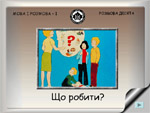 |
|
Розмова 10 – Що робити?
Мама питає, що тато й діти хочуть робити сьогодні. Оленка хоче писати листи. Петрик хоче йти надвір, а Тарас хоче грати в теніс. Тато хоче читати журнал, а мама йде відпочивати.
|
Common sentence patterns:
subject------------------verb-------------direct object
Мама (subject) пише (verb) е-листи (direct object).
subject-----------------verb-------------prepositional phrase
Діти (subject) йдуть (verb) на гокей (prepositional phrase).
Ми (subject) говоримо (verb) про Романа (prepositional phrase).
Review of Cases and their uses:
Називний – The Nominative Case is used:
a. when a noun is the subject of the sentence
b. when a noun follows the verb є (often omitted in Ukrainian)
Masculine: дім, пан, хлопець, чоловік (end in a consonant or ь)
Feminine: дівчина, жінка, пані, панна (end in а or я, exception - i)
Кличний - The Vocative Case is used when addressing someone or calling out to them. It is best to memorize the pattern of endings; you will need to know them automatically for most conversations.
Masculine: ending in a consonant - add е (Тарасе, Романе, пане)
ending in й - change to ю (Андрію)
ending in ь - change to ю (Василю)
Feminine: ending in a - change to o (Оленко, панно, Анно)
ending in ія - change to іє (Маріє, Надіє, Юліє)
ending in я - change to ю (Лесю, Надю)
After the Vocative form ‘пане’, a male surname does not change to the Vocative form, i.e. Пане Білан! Пане Козак! The word пані and the corresponding female surname do not change to the Vocative form, i.e. Пані Білан! Пані Козак!
Родовий – The Genitive Case is used with the preposition дo:
Feminine: ending in a - change to и (до Оленки, панни, Анни)
ending in ія - change to ії (до Марії, Надії, Юлії)
ending in я - change to і (до Савелі, Наді)
Masculine: ending in a consonant – add а (до Тараса, Романа, пана)
ending in й - change to я (до Андрія)
ending in ь - change to я (до Василя)
ending in о - change to а (до тата)
Знахідний – The Accusative case is used:
a. when a noun is the direct object in a sentence.
b. when a noun follows the preposition про
c. after the preposition у/в with the days of the week
d. after the preposition у/в with sports and games (motion, action)
e. after the preposition на with motion or participation in events
Masculine inanimate nouns do not change, i.e. баскетбол, бейсбол, бовлінґ, волейбол, гокей, ґольф, журнал, зошит, керлінґ, лист, підручник, словник, спорт, тато, текст, теніс, футбол
Feminine nouns change as follows:
ending in a - change to у (про маму, панну, Анну)
ending in я - change to ю (про Галю, Надю, Марію)
Plural nouns do not change, i.e. у карти, шахи, шашки
Місцевий – The Locative Case is used to indicate the location of a noun (stationary, not moving). It is always preceded by one of two prepositions: у (в) or на.
Masculine: ending in a consonant – add і (в Едмонтоні, Саскачевані), ending in г - change to зі (у Вінніпезі)
Feminine: ending in a - change to і (в Оттаві, Канаді), ending in я - change to ї (у Британській Колюмбії)
Neuter: ending in o - change to і (у Торонті)
Орудний – The Instrumental Case is used after the preposition з (with):
Masculine: ending in a consonant – add ом (з Романом, Іваном), ending in о - change to ом (з Марком, татом), ending in й - change to єм (з Андрієм), ending in ь - change to ем (з Василем, учителем)
Feminine: ending in a - change to ою (з Оксаною, панною), ending in я - change to ею (зі Сонею, Іркою), ending in ія - change to єю (з Юлією, Надією)
Давальний – The Dative Case has been introduced, but not emphasized in the course material. It is used to indicate an indirect object of a verb.
Tато читає журнал Миронові
(indirect object Мирон follows direct object журнал).
Masculine: ending in a consonant - add ові (Романові, Іванові),
ending in о - change to ові (Маркові, татові),
ending in й - change to єві (Андрієві),
ending in ь - change to еві (Василеві, вчителеві)
Feminine: ending in a - change to і (Оксані, панні),
ending in я - change to і (Соні, Марусі),
ending in ія - change to ії (Юлії, Надії)
4. Prepositions are governed by the specific Cases.
ПРО Accusative
У(В) Accusative, Locative
НА Accusative, Locative
ПРИ Locative
ДО Genitive
З(ІЗ, ЗІ) Instrumental
Adverbs may be categorized by place, time or manner.
Adverbs of place: тут, там, ось, куди, де, додому, удома, надвір
Adverbs of time: коли, тепер, сьогодні, вчора, завтра, щотижня, щодня, часто.
Cultural Enrichment Segments You should be familiar with the vocabulary and structures presented in each of the Cultural Enrichment segments studied in e-mova: Core Ukrainian 10. Review the material thoroughly. Links are provided below.
Cultural Enrichment A : Ukrainian Dance and Regions of Ukraine (Level 1)
Cultural Enrichment B : Ukrainians in the World (Level 1)
You have now reviewed the content of e-mova: Core Ukrainian 10. If you find that you still have questions or if there are areas which remain unclear, please discuss these with your instructor.
|












